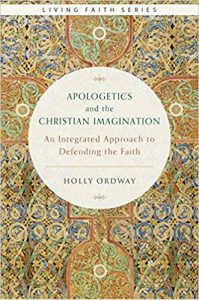Apologetics and the Christian Imagination (Holly Ordway, 2017)

Apologetics both reasonable and imaginative
Imagination and reason turn out to be intimately related. If you doubt that consider this common experience: You are at the airport to meet a friend whom you haven’t seen in several years. Waiting near the luggage carousels, you watch the doors from the arrival gates swing open and a mass of people surge in your direction. You scan the crowd searching for your friend, and there she is—you smile and begin to wave and then notice no that isn’t her. It looks like her, but a second’s thought confirms it, it isn’t her. Then you spot her, and have to look and consider a bit more—she’s dyed her hair since you were together last, and is wearing glasses now but yes, it’s definitely her.
Now consider: what just transpired was a seamless interplay between your imagination and your reason. Both were equally necessary to accomplish your mission of meeting your friend, and neither acting alone would have been sufficient. Your imagination provided an image of the person you were seeing and remembering from the past and your reason determined whether or not the person in the crowd was the friend you had come to meet. Rather than being at odds, or working in vastly different realms of thought, imagination and reason not only work together, they need each other if we are to make sense of life, truth and reality.
This common airport experience is one way Dr. Holly Ordway explains the relationship between imagination and reason in her book, Apologetics and the Christian Imagination. “Imagination is the human faculty,” she says, “that assimilates sensory data into images, upon which the intellect can then act; it is the basis of all reasoned thought as well as all artistic, or what we would call ‘imaginative’ exercise.” In this she is building on the thought of C. S. Lewis who argued that, “reason is the natural organ of truth; but imagination is the organ of meaning” [p. 16].
Ordway is Professor of English at Houston Baptist University with a scholarly interest in Tolkien and Lewis. They demonstrated a compelling defense of Christianity by developing both answers and stories, arguments and images. In other words they used reason and imagination together in order to show that the faith is both credible and plausible. Ordway believes too much of Christian apologetics depends on reason while ignoring the crucial role of the imagination. And now, she argues, as our world has become increasingly post-Christian our defense of the faith must once again embrace both.
One specific way this works out is in the area of ideas and what they mean. When we talk about the Christian gospel and mention, for example, God, guilt, justice or redemption, we must not assume that our non-Christian friends mean the same thing we do when they use the same terms. What a secular friend means when he speaks movingly of personal guilt is most likely not what the Bible means when it teaches we are sinners in need of divine forgiveness. “A significant part of the apologist’s work,” Ordway says, “involves discerning what preconceptions, difficulties, and context the audience is likely to have, so as to write or speak in such a way as to increase the likelihood that the ideas are understood as intended” [p. 31].
Imagination allows us to see into another person’s world and life view to understand what they mean and why. Imagination allows us to use metaphor and story to make ideas, arguments and doctrines vivid, alive and meaningful. Reason allows us to ask probing questions so we get past the surface of things and uncover what’s really at stake. Reason provides critical tools to examine claims and counterclaims, to seek definitions that clarify and to find answers that satisfy. Together a holy spirited imagination and reason provide us with what we need “to give an answer to everyone who asks [us] to give the reason for the hope that [we] have” (1 Peter 3:15).
I recommend Apologetics and the Christian Imagination to you.

